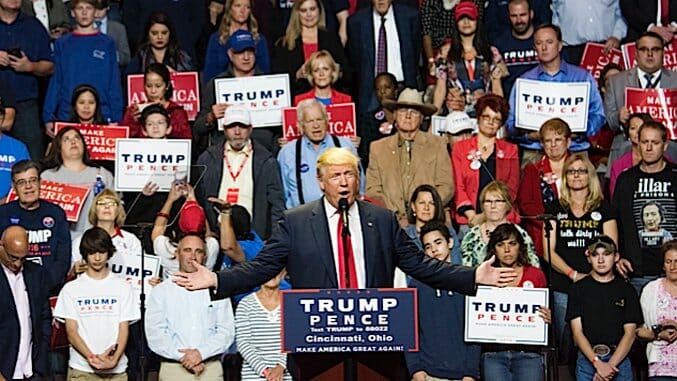The GOP Was Trying to Become More Inclusive. Then Trump Happened.
Photo by Ty Wright/Getty
A smiling Marco Rubio shakes hands with Hillary Clinton after a sharp and personable performance in the most recent presidential debate. In the spin room, Bobby Jindal touts Rubio’s support for immigration reform and Chris Christie assures the base that a Rubio White House would be tough on crime while making sensible criminal justice reforms. On Fox News the next morning, vice presidential nominee Lindsey Graham chats about his plan to defeat ISIS without alienating American Muslims. Meg Whitman tweets her support. Donald Trump hasn’t been seen for months.
It’s three weeks till the 2016 election, and this is the alternate universe to which Reince Priebus escapes when it all gets to be too much. His party’s actual sleazeball of a nominee, who somehow hasn’t quit after a tape emerged of him bragging about sexual assault, is now publicly feuding with the Speaker of the House and many other prominent Republicans, so the RNC chairman must have been talking about some other reality when he said, “Everything is on course,” right?
At times like these, Priebus must think wistfully of the Growth & Opportunity Project, the “autopsy” he commissioned after Mitt Romney lost the 2012 presidential election. The report, delivered in 2013, prescribed a new path for the GOP, which Priebus hoped would lead to a new era of inclusivity. Today, it reads like an alternative history, a lament for the road not taken.
The 97-page document openly stated the party’s biggest problem: it could easily appeal to older voters and white men, but most other groups tended to believe that “the GOP does not care about them.”
“Young voters are increasingly rolling their eyes at what the Party represents,” the report says, noting that nobody under the age of 51 had been eligible to vote when Ronald Reagan first ran for President. “We sound increasingly out of touch.”
Stances like opposition to gay marriage, it said, were non-starters with demographics the party needed to win. Likewise, immigration reform and a more welcoming tone would be required if Republicans ever hoped to make headway with Hispanic voters:
“If Hispanic Americans perceive that a GOP nominee or candidate does not want them in the United States (i.e. self-deportation), they will not pay attention to our next sentence.”
Remember, in 2013 “self-deportation” was still the craziest thing someone wishing to be taken seriously could propose regarding immigration. It was a simpler time.
-

-

-

-

-

-

-

-

-

-

-

-

-

-

-

-

-

-

-

-

-

-

-

-

-

-

-

-

-

-

-

-

-

-

-

-

-

-

-

-








































